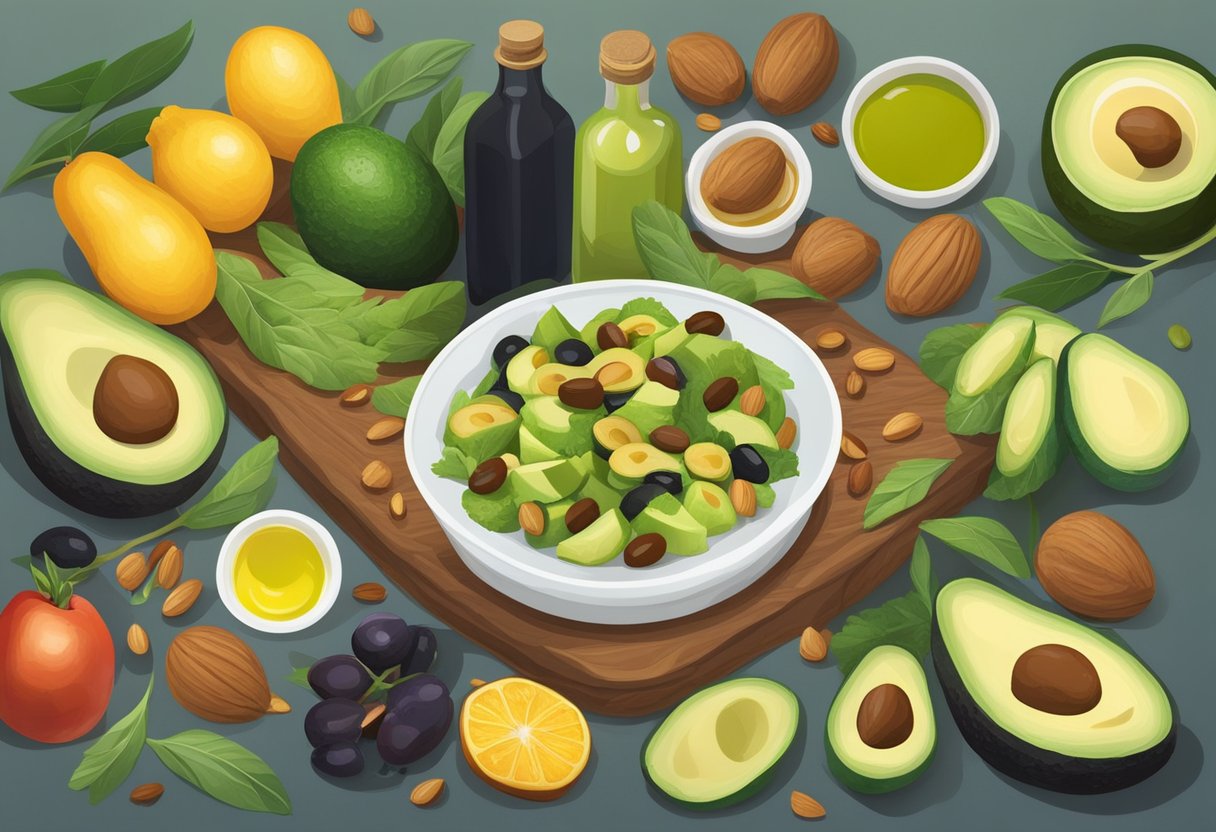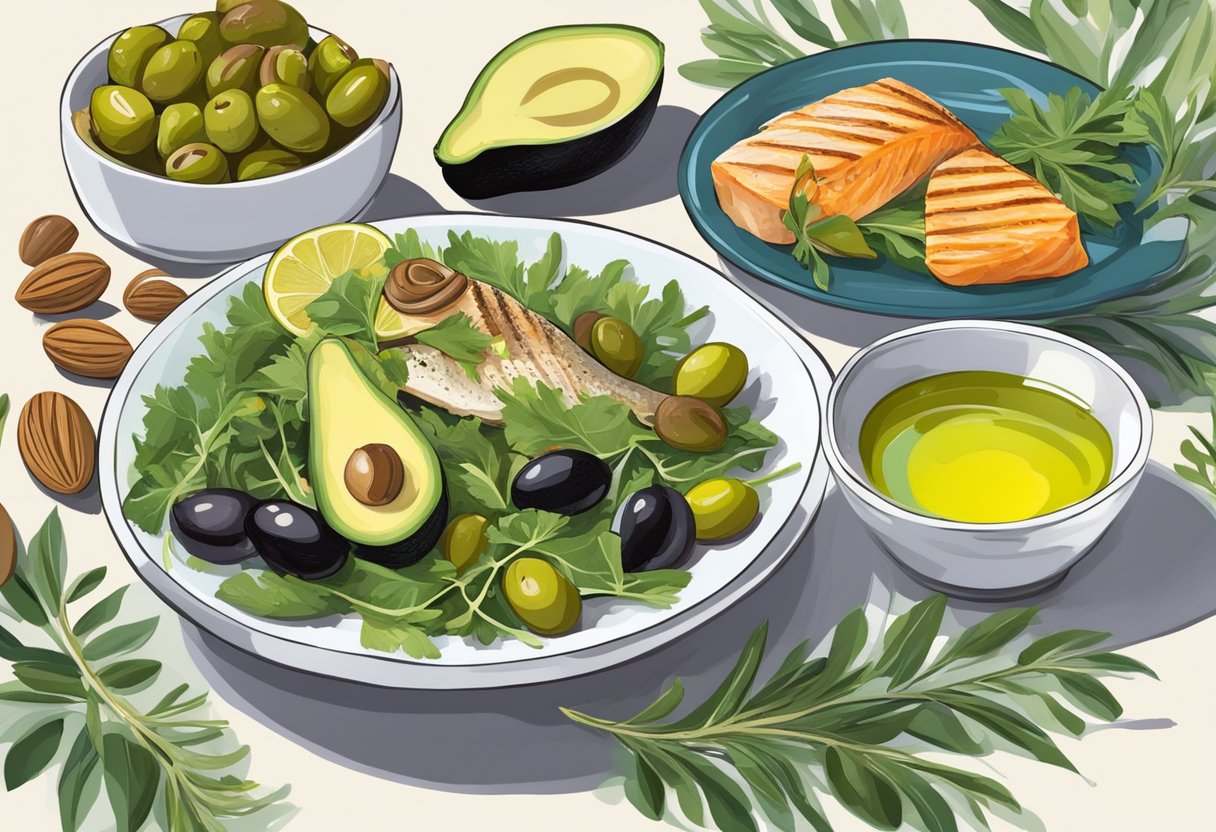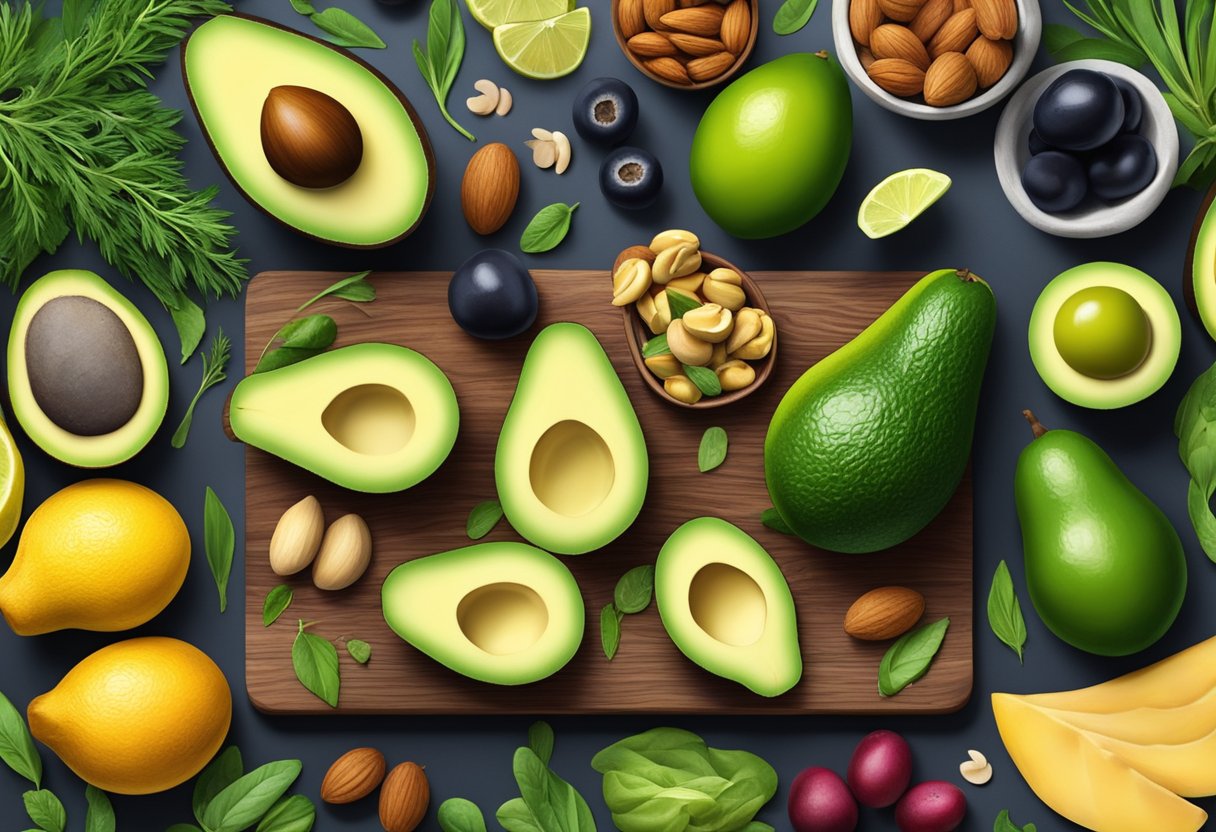Embracing a gluten-free Mediterranean diet not only caters to those with gluten sensitivities but also offers a rich tapestry of nutritional benefits through its focus on healthy fats. Healthy fats, such as those found in olive oil and avocados, are central to this dietary pattern and are known for their heart-protective properties. Integrating a variety of these fats into a gluten-free Mediterranean diet can be a seamless and rewarding endeavor, promoting wellness while accommodating dietary restrictions.

The gluten-free Mediterranean diet advocates for a high intake of fruits, vegetables, legumes, and whole grains that are naturally free of gluten. This approach emphasizes replacing saturated fats found in red meats and processed foods with monounsaturated and polyunsaturated fats which support brain and heart health. By following this dietary framework, individuals can enjoy the myriad flavors and health benefits of the Mediterranean lifestyle without the concerns of gluten.
Key Takeaways
- Healthy fats are a cornerstone of the gluten-free Mediterranean diet, offering numerous health benefits.
- A gluten-free adaptation of the Mediterranean diet includes a variety of naturally gluten-free, nutrient-dense foods.
- Meal planning focuses on dietary diversity and includes healthy fats to support overall wellness.
Table of Contents
Understanding Healthy Fats
Healthy fats play a pivotal role in the diet, particularly in the context of a gluten-free Mediterranean diet. They contribute to overall well-being and the prevention of chronic diseases.
Types of Fats and Their Role in Health
Fats are macronutrients essential for numerous bodily functions. They are classified into saturated, monounsaturated, and polyunsaturated fats. Saturated fats, found in animal products and processed foods, are generally solid at room temperature and should be consumed in moderation. On the other hand, monounsaturated and polyunsaturated fats, which include omega-3 and omega-6 fatty acids, are considered more beneficial. These healthy fats are found in plant-based oils, such as olive oil, avocado, nuts, and seeds.
Benefits of Healthy Fats in the Diet
Including healthy fats in the diet offers multiple health benefits. They can reduce the risk of heart disease by improving blood cholesterol levels. Moreover, these fats possess anti-inflammatory properties that can help reduce inflammation in the body. For example, olive oil is renowned for its heart-healthy effects and is a staple in the gluten-free Mediterranean diet. Additionally, avocados, nuts, and seeds contribute not only healthy fats but also a variety of vitamins and minerals. Fish, especially fatty types like salmon, is rich in omega-3 fatty acids, which are crucial for heart health and cognitive functions. The inclusion of these nutrient-dense foods can align well with the goals of a gluten-free Mediterranean diet, focusing on the promotion of long-term health benefits.
Essentials of the Gluten-Free Mediterranean Diet

The Mediterranean diet emphasizes heart-healthy fats and high-fiber foods, while avoiding gluten is crucial for individuals with celiac disease. Merging these two dietary patterns forms the cornerstone of a gluten-free Mediterranean lifestyle that incorporates beneficial nutrition without compromising wellness for those requiring gluten-free options.
Key Components of the Diet
-
Vegetables and Fruits: They form the base of the diet, providing essential vitamins, minerals, and fiber. Daily consumption should include a variety of both raw and cooked vegetables, with fruits serving as a typical dessert.
-
Legumes: Beans, lentils, and chickpeas are excellent protein sources and rich in nutrients and fiber, which also make them a gluten-free staple.
-
Healthy Fats: Olive oil is the primary source of added fat, recognized for its monounsaturated fats that contribute to heart health. Other healthy fats include nuts and seeds.
-
Protein Sources: While fish and seafood are encouraged several times a week, poultry, eggs, and dairy products are to be consumed in moderation.
-
Gluten-Free Grains and Alternatives
Suitable Grains for Gluten-Free Diets:
Grain Notes Quinoa A complete protein, rich in fiber. Brown Rice Offers B vitamins and magnesium. Buckwheat Despite the name, it’s gluten-free. Corn Versatile in forms like polenta. Certified Gluten-Free Oats Avoid cross-contaminated oats.
It is pivotal when following a gluten-free Mediterranean diet to select grains that are uncontaminated with gluten. Using alternatives like quinoa and buckwheat can provide the same satisfaction as traditional grains while keeping health concerns in mind. These staples are foundational in maintaining a diet that is both culturally rich and accommodating to dietary restrictions.
Meal Planning and Recipes

In integrating healthy fats into a gluten-free Mediterranean diet, structuring meal plans and choosing the right recipes ensure a balanced intake of nutrients. Below are subsections designed to provide practical ideas for breakfast, lunch, dinner, snacks, and sweets that adhere to dietary guidelines while focusing on delicious, healthy fats.
Creating a Balanced Meal Plan
Meal planning should be done with an emphasis on variety to provide all necessary nutrients. The foundation includes vegetables, fruits, nuts, seeds, lean proteins, and of course, healthy fats like olive oil and avocados. Each meal should incorporate these elements to maintain the pillars of the Mediterranean diet.
Gluten-Free Mediterranean Breakfast Ideas
Breakfast plays a pivotal role in starting the day with energy and nutrition. Options such as a quinoa salad with nuts and fresh fruit or an omelette packed with vegetables and feta cheese make for gluten-free meals rich in healthy fats and protein.
Lunch and Dinner Recipes
For lunch, a vibrant chickpea salad seasoned with extra-virgin olive oil provides a balance of fiber and healthy fats. Dinner could feature a grilled fish or lean chicken side by a lentil salad, accommodating both the need for essential fatty acids and the avoidance of gluten.
Healthy Snacks and Sweets
Opt for snacks such as Greek yogurt with honey and walnuts or simple fruit salads enhanced with a sprinkle of chia seeds. For sweets, almond flour-based pastries or dark chocolate demonstrate that one can indulge while still following a gluten-free diet meal plan.
Nutritional Considerations and Adaptations

When transitioning to a gluten-free Mediterranean diet, it’s essential to understand the adjustments needed to maintain balanced nutrition, with an emphasis on healthy fats, and to ensure that the diet remains rich in nutrients, fiber, and protein without gluten-containing grains.
Adapting to Dietary Restrictions
Individuals adopting a gluten-free Mediterranean diet need to replace traditional whole grains with gluten-free alternatives that still offer high nutritive value. Quinoa and brown rice, for instance, can substitute for wheat and provide necessary fiber and protein. With an emphasis on vegetables, fruits, legumes, and nuts, this dietary pattern naturally includes a diversity of vitamins and minerals. It is critical that one chooses gluten-free whole grains to maintain the fiber content that aids in digestion and can be beneficial for managing conditions like type 2 diabetes.
Inclusion of dairy products such as Greek yogurt and cheeses not only enhances the flavor profile but also contributes to the diet’s calcium and protein content. For those who eschew dairy, nutrient-dense alternatives like almond or soy milk can be integrated. It’s recommended that individuals consult with a registered dietitian to tailor the diet to their specific nutritional needs, especially concerning potential deficiencies.
Supplementation and Nutrient Density
Despite the natural nutrient richness of the gluten-free Mediterranean diet, some individuals may require supplements to meet their nutritional needs. Particular attention should be given to vitamins like D and B12, commonly found in fortified grains and meats. Vitamin D can be obtained from eggs or fortified dairy products, while plant-based sources and supplementation can ensure adequate vitamin B12 intake.
Ensuring nutrient density in every meal is crucial. For example, incorporating eggs as a source of high-quality protein and vitamins into one’s diet can add nutritional value without gluten. A strategy for preserving nutrient density is to incorporate a variety of colorful produce, healthy fats from sources such as avocados and olive oil, and lean proteins from fish and poultry to ensure a comprehensive profile of essential nutrients.
By strategically selecting foods and considering the need for possible supplementation, individuals on a gluten-free Mediterranean diet can enjoy a flavorful, nutritious diet that supports long-term health.
Health Benefits and Prevention

Adopting a gluten-free Mediterranean diet introduces a variety of healthy fats that are vital for managing chronic diseases and sustaining overall health. The diet emphasizes fats from plant sources and fish, which contribute to a multitude of health benefits.
Cardiovascular Health
Healthy fats, particularly those found in olive oil, nuts, and fatty fish, are cornerstones of the gluten-free Mediterranean diet. They support cardiovascular health by improving blood lipid profiles, lowering blood pressure, and reducing the risk of heart disease. A diet high in mono- and polyunsaturated fats can lead to fewer heart-related events and a lower likelihood of stroke.
Preventing Diabetes and Controlling Blood Sugar
Individuals consuming healthy fats from a gluten-free Mediterranean diet may find it easier to control their blood sugar levels, lowering the risk of diabetes. These fats, in combination with a diet low in refined sugars and high in fiber, help maintain steady blood sugar and insulin levels, providing long-term benefits for metabolic health.
Cancer and Inflammation Reduction
The antioxidants present in the gluten-free Mediterranean diet, alongside its healthy fats, can contribute to the reduction of inflammation, which is often linked to cancer. Foods rich in omega-3 fatty acids, such as certain fish, have properties that may help in inflammation reduction and consequently potentially lower the risk of certain cancers.
Cognitive Health and Neurological Diseases
Fats from the Mediterranean diet may play a role in cognitive health. Studies suggest that healthy dietary patterns like this one, which is abundant in omega-3 fatty acids, could be beneficial in preventing diseases like Alzheimer’s. This diet is associated with a lower incidence of neurological diseases and may protect against cognitive decline.
Lifestyle and Additional Considerations

Adopting a gluten-free Mediterranean diet extends beyond food choices; it involves embracing a holistic lifestyle that includes regular physical activity, moderation in alcohol consumption, and a preference for whole foods over processed alternatives. Each of these elements contributes to the health benefits associated with the Mediterranean way of living.
Incorporating Exercise into the Mediterranean Lifestyle
In the Mediterranean lifestyle, exercise is as important as dietary habits. Regular physical activity, such as walking, swimming, or cycling, is integrated into daily life. These forms of exercise not only complement the healthy fats in a gluten-free Mediterranean diet but also support cardiovascular health and overall well-being.
Understanding the Role of Wine and Alcohol
Moderation is key when it comes to wine and alcohol consumption in the Mediterranean diet. While red wine is often highlighted for its potential health benefits, including the presence of antioxidants, it should be consumed in moderation. Typically, this is defined as one glass per day for women and up to two for men, always paired with meals to align with Mediterranean traditions.
The Importance of Whole Foods over Processed
The cornerstone of the Mediterranean diet is the emphasis on whole foods. This means prioritizing fresh fruits, vegetables, nuts, seeds, and grains that are naturally gluten-free. These foods replace processed items, which are often high in added sugars, unhealthy fats, and preservatives. Eating whole foods ensures a nutrient-rich diet and aligns with the Mediterranean philosophy of eating closer to nature.
Frequently Asked Questions
Understanding the role of healthy fats in a gluten-free Mediterranean diet is essential. They contribute to overall health and enhance the flavors of gluten-free dishes.
What types of oils are commonly used in gluten-free Mediterranean cooking?
Olive oil is the cornerstone of Mediterranean cuisine, lauded for its health benefits and versatility in gluten-free cooking. It’s recommended to use extra-virgin olive oil for its higher quality and nutrient content.
Which nuts and seeds should be included in a gluten-free Mediterranean diet for optimal health benefits?
Almonds, cashews, and chia seeds are excellent options in a gluten-free Mediterranean diet. They provide essential fats, proteins, and a variety of micronutrients that support heart health and reduce inflammation.
How can one incorporate avocados into a gluten-free Mediterranean diet effectively?
Avocados can be included by adding slices to salads, mashing them as a spread for gluten-free toast, or blending them into smoothies. This fruit offers monounsaturated fats and a plethora of vitamins and minerals.
What are some gluten-free whole grain options that align with Mediterranean diet principles?
Quinoa, amaranth, and buckwheat are suitable gluten-free grains for the Mediterranean diet. These grains contribute important nutrients and fiber while keeping the diet varied and satisfying.
In what ways can olives and olive products be used in gluten-free Mediterranean dishes?
Olives can be tossed into salads, used to enhance the flavor of fish, poultry dishes, and integrated into tapenades. Olive products, such as olive tapenade, can be used as a condiment or a flavor booster in gluten-free recipes.
What dairy products are recommended for a balanced gluten-free Mediterranean diet?
Low-fat Greek yogurt, feta, and ricotta are dairy products that complement a gluten-free Mediterranean diet. They should be consumed in moderation to add calcium, protein, and probiotics while maintaining the diet’s emphasis on balance and health.



